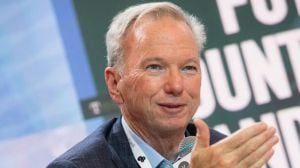Unilever sees potential in food sector
MUMBAI, Dec 4: India's recent performance compared favourably with other developing countries and the country would find its own pace and...

MUMBAI, Dec 4: India’s recent performance compared favourably with other developing countries and the country would find its own pace and route map for reforms, Unilever group chairman Niall Fitzgerald said here today.
Capital controls might have helped shield India from the storm that had beset other economies across Asia but many would argue that the degree of protection had come at a price – that a more open economy would have attracted more foreign investment over the years, he said.
Capital controls can be adopted in the short term to stench crises, flexible approaches can be adopted towards structural adjustment, but no government can get away from the responsibility of explaining the benefits of reform to the people who currently feel excluded by the process.
Fitzgerald stressed on the role of foreign business in emering markets, and called upon the private sector entrepreneurs to communicate the benefits of reform to the people.
Citing an exapmple, he said if the world were telescoped into asmall village of 100 inhabitants, 48 people in the global village would be under 25 years old, one in three adults would be unable to read, five inhabitants would corner half the wealth, only one would have college education, and while Europe, the Americas and Africa would have 13 inhabitants each, Asia would account for as many as 61.
In the Indian context, Fitzgerald provided the example of the fruits and vegetable processing industry, in which, he said, India annually wastes an output equal to the entire output of the United Kingdom. A mere two per cent of fruits and vegetables produced in India are processed, so that modern business practices are impossible to introduce in this sector. For that to happen, infrastructure–which inlcude cold chains and other storage facilities—must be put in place.
The government must partner private and foreign business, which have experience in these sectors. "Unilever is prepared to working partnership with other Indian and multinational corporatoins as well as thestate and national governments and the development banks and financial institutions to see this infrastructure established," he said.
Foreign business has a role to play, and the government must recognise the possibilities of partnership, said the Unilever chairman. He pointed out that for local sourcing partners, Hindustan Lever’s partnership has implied plant and capital expansion, more skills acquisition, and exposure to Hindustan Lever’s quality assurance systems, IT systems and high levels of labour and capital productivity.
On the distribution side, it has meant partnerships with around 7,000 redistribution stockists, ensuring direct coverage of around one million outlets ("a staggering number for any Europe-based business"), with wholesale channels reaching another three million outlets.
He said reform must be made intellegible to the majority of people who currently feel excluded from its benefits, and this would require fruitful partnership between private sector enterprise and thegovernment.






- 01
- 02
- 03
- 04
- 05

























